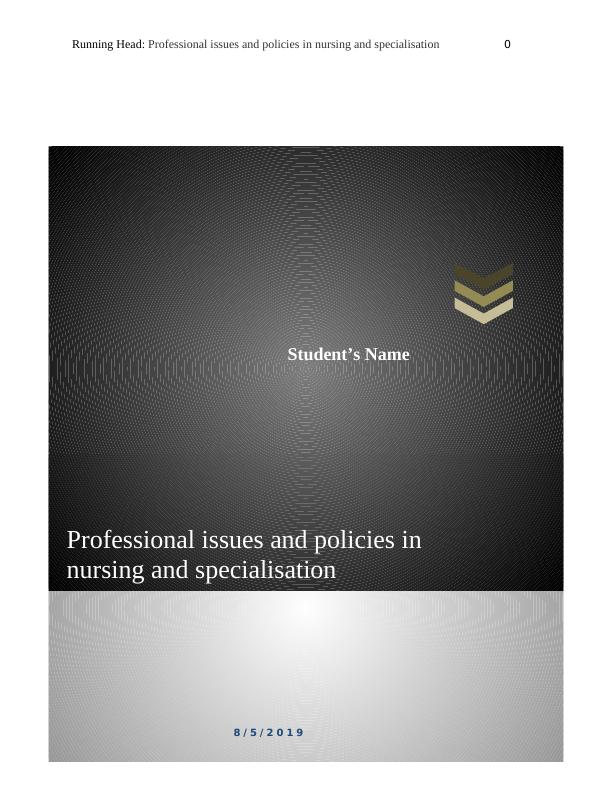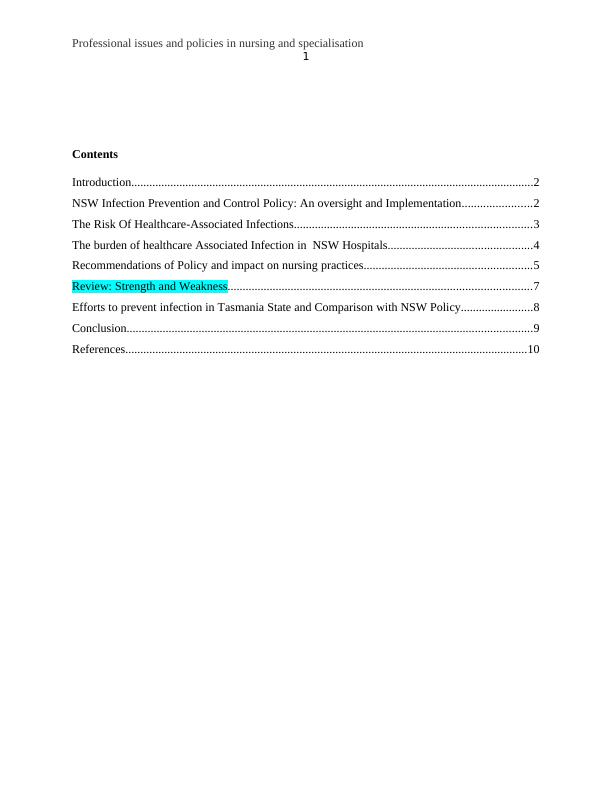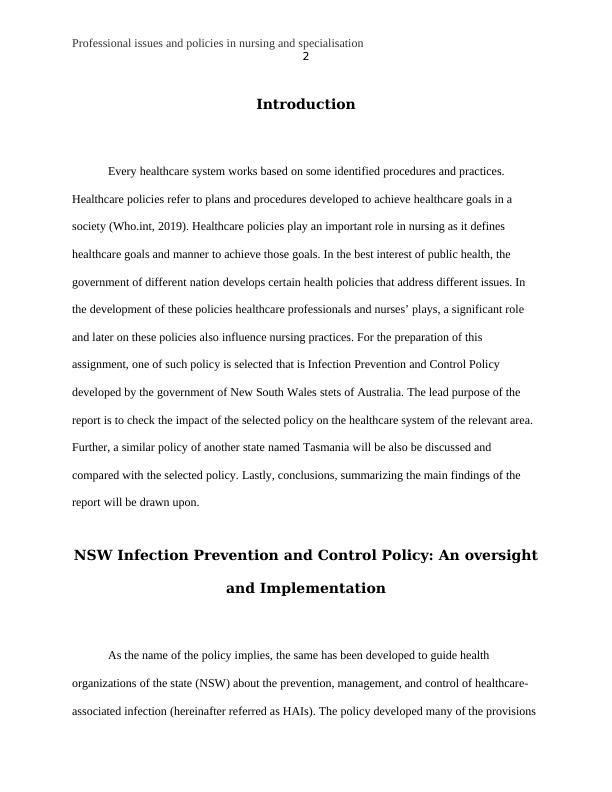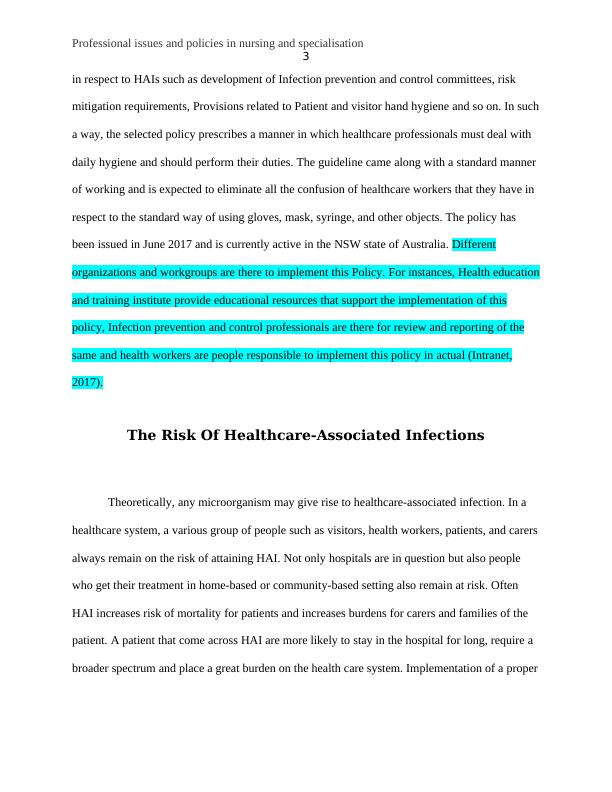Professional issues and policies in nursing and specialisation
Added on 2022-10-12
12 Pages2966 Words284 Views
Professional issues and policies in
nursing and specialisation
Running Head: Professional issues and policies in nursing and specialisation 0
8 / 5 / 2 0 1 9
Student’s Name
nursing and specialisation
Running Head: Professional issues and policies in nursing and specialisation 0
8 / 5 / 2 0 1 9
Student’s Name

Professional issues and policies in nursing and specialisation
1
Contents
Introduction......................................................................................................................................2
NSW Infection Prevention and Control Policy: An oversight and Implementation.......................2
The Risk Of Healthcare-Associated Infections...............................................................................3
The burden of healthcare Associated Infection in NSW Hospitals................................................4
Recommendations of Policy and impact on nursing practices........................................................5
Review: Strength and Weakness.....................................................................................................7
Efforts to prevent infection in Tasmania State and Comparison with NSW Policy........................8
Conclusion.......................................................................................................................................9
References......................................................................................................................................10
1
Contents
Introduction......................................................................................................................................2
NSW Infection Prevention and Control Policy: An oversight and Implementation.......................2
The Risk Of Healthcare-Associated Infections...............................................................................3
The burden of healthcare Associated Infection in NSW Hospitals................................................4
Recommendations of Policy and impact on nursing practices........................................................5
Review: Strength and Weakness.....................................................................................................7
Efforts to prevent infection in Tasmania State and Comparison with NSW Policy........................8
Conclusion.......................................................................................................................................9
References......................................................................................................................................10

Professional issues and policies in nursing and specialisation
2
Introduction
Every healthcare system works based on some identified procedures and practices.
Healthcare policies refer to plans and procedures developed to achieve healthcare goals in a
society (Who.int, 2019). Healthcare policies play an important role in nursing as it defines
healthcare goals and manner to achieve those goals. In the best interest of public health, the
government of different nation develops certain health policies that address different issues. In
the development of these policies healthcare professionals and nurses’ plays, a significant role
and later on these policies also influence nursing practices. For the preparation of this
assignment, one of such policy is selected that is Infection Prevention and Control Policy
developed by the government of New South Wales stets of Australia. The lead purpose of the
report is to check the impact of the selected policy on the healthcare system of the relevant area.
Further, a similar policy of another state named Tasmania will be also be discussed and
compared with the selected policy. Lastly, conclusions, summarizing the main findings of the
report will be drawn upon.
NSW Infection Prevention and Control Policy: An oversight
and Implementation
As the name of the policy implies, the same has been developed to guide health
organizations of the state (NSW) about the prevention, management, and control of healthcare-
associated infection (hereinafter referred as HAIs). The policy developed many of the provisions
2
Introduction
Every healthcare system works based on some identified procedures and practices.
Healthcare policies refer to plans and procedures developed to achieve healthcare goals in a
society (Who.int, 2019). Healthcare policies play an important role in nursing as it defines
healthcare goals and manner to achieve those goals. In the best interest of public health, the
government of different nation develops certain health policies that address different issues. In
the development of these policies healthcare professionals and nurses’ plays, a significant role
and later on these policies also influence nursing practices. For the preparation of this
assignment, one of such policy is selected that is Infection Prevention and Control Policy
developed by the government of New South Wales stets of Australia. The lead purpose of the
report is to check the impact of the selected policy on the healthcare system of the relevant area.
Further, a similar policy of another state named Tasmania will be also be discussed and
compared with the selected policy. Lastly, conclusions, summarizing the main findings of the
report will be drawn upon.
NSW Infection Prevention and Control Policy: An oversight
and Implementation
As the name of the policy implies, the same has been developed to guide health
organizations of the state (NSW) about the prevention, management, and control of healthcare-
associated infection (hereinafter referred as HAIs). The policy developed many of the provisions

Professional issues and policies in nursing and specialisation
3
in respect to HAIs such as development of Infection prevention and control committees, risk
mitigation requirements, Provisions related to Patient and visitor hand hygiene and so on. In such
a way, the selected policy prescribes a manner in which healthcare professionals must deal with
daily hygiene and should perform their duties. The guideline came along with a standard manner
of working and is expected to eliminate all the confusion of healthcare workers that they have in
respect to the standard way of using gloves, mask, syringe, and other objects. The policy has
been issued in June 2017 and is currently active in the NSW state of Australia. Different
organizations and workgroups are there to implement this Policy. For instances, Health education
and training institute provide educational resources that support the implementation of this
policy, Infection prevention and control professionals are there for review and reporting of the
same and health workers are people responsible to implement this policy in actual (Intranet,
2017).
The Risk Of Healthcare-Associated Infections
Theoretically, any microorganism may give rise to healthcare-associated infection. In a
healthcare system, a various group of people such as visitors, health workers, patients, and carers
always remain on the risk of attaining HAI. Not only hospitals are in question but also people
who get their treatment in home-based or community-based setting also remain at risk. Often
HAI increases risk of mortality for patients and increases burdens for carers and families of the
patient. A patient that come across HAI are more likely to stay in the hospital for long, require a
broader spectrum and place a great burden on the health care system. Implementation of a proper
3
in respect to HAIs such as development of Infection prevention and control committees, risk
mitigation requirements, Provisions related to Patient and visitor hand hygiene and so on. In such
a way, the selected policy prescribes a manner in which healthcare professionals must deal with
daily hygiene and should perform their duties. The guideline came along with a standard manner
of working and is expected to eliminate all the confusion of healthcare workers that they have in
respect to the standard way of using gloves, mask, syringe, and other objects. The policy has
been issued in June 2017 and is currently active in the NSW state of Australia. Different
organizations and workgroups are there to implement this Policy. For instances, Health education
and training institute provide educational resources that support the implementation of this
policy, Infection prevention and control professionals are there for review and reporting of the
same and health workers are people responsible to implement this policy in actual (Intranet,
2017).
The Risk Of Healthcare-Associated Infections
Theoretically, any microorganism may give rise to healthcare-associated infection. In a
healthcare system, a various group of people such as visitors, health workers, patients, and carers
always remain on the risk of attaining HAI. Not only hospitals are in question but also people
who get their treatment in home-based or community-based setting also remain at risk. Often
HAI increases risk of mortality for patients and increases burdens for carers and families of the
patient. A patient that come across HAI are more likely to stay in the hospital for long, require a
broader spectrum and place a great burden on the health care system. Implementation of a proper

End of preview
Want to access all the pages? Upload your documents or become a member.
Related Documents
Policy Analysis Essay 2022lg...
|13
|3729
|20
Assignment on Evidence Based Practice Projectlg...
|17
|3425
|14
Policy Development Case Study 2022lg...
|9
|1991
|16
Hand Washing under Acute Care Settings | Reportlg...
|13
|2986
|17
Infection Control Policy for Healthcare Associated Infectionslg...
|9
|2369
|375
Hand Hygiene for Healthcare Associated Infections: An Evidence-Based Practice Approachlg...
|13
|2661
|243
